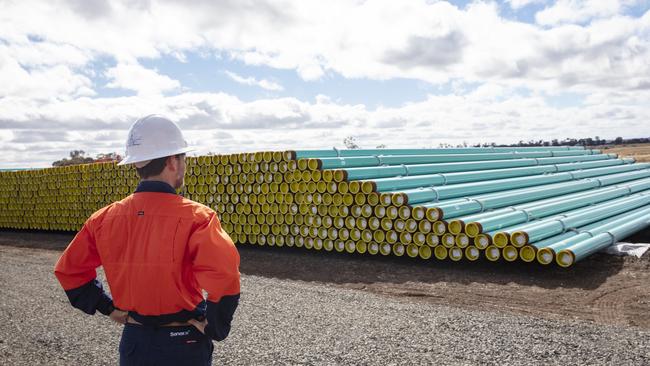
Queensland ALP Premier Annastacia Palaszczuk must be enjoying exposing weaknesses of the “new Labor” policies of Victorian ALP Premier Daniel Andrews.
Queensland’s Senex has signed a contracts to supply its recently-discovered Surat basin coal gas to CSR’s Brisbane brick and plasterboard operation, as well as packaging company Orora and glass manufacturer O-I.
Such an arrangement would be banned in Victoria because no onshore gas exploration is allowed. In contrast, Palaszczuk is setting aside “domestic only” gas prospective areas which Senex is exploiting. Senex is supplying its gas to the Wallumbilla Gas Hub in Queensland via a 60km pipeline it has built.
READ MORE: Energy Minister backs tech to tackle emissions | Cheaper power on the way | Carbon offset plan dumped
CSR’s decision to buy the gas means it is locking in prices in the vicinity of $8 a gigajoule.
If Victoria was to ever unlock its vast low-cost gas reserves national gas prices might fall. To a lesser extent, the same lower price forces would be unleashed if NSW Premier Gladys Berejiklian allowed the development of Narrabri gas. But CSR wants certainty and so is taking a price risk.
Rather than develop its rich, low-cost, non-fracked gas reserves, Victoria wants Queensland to divert more of its higher-cost fracked gas from exports to the domestic market in order to cover the shortages Victoria and NSW have artificially created.
Along with federal ALP leader Anthony Albanese, Queensland is looking establish energy policies that bring back traditional Labor voters in industrial areas.
In contrast, Daniel Andrews is switching Victoria’s ALP to a party based around inner city green votes and education and tourism, leaving the traditional ALP strongholds – industrial plants and their workers – with higher cost and less certain energy supplies.
In his Melbourne Mining Club address last week Alumina CEO Mike Ferraro said that a decision as to whether to close the company’s vast Portland aluminium smelter would be made next year when the current power contract expires.
Nearby, across the South Australian border, the SA government allows onshore gas exploration. Cooper Energy and Beach Petroleum have drilled and struck what appears to be a large onshore gas reserve.
But inconveniently, the structure extends across the Victorian border into Andrews country, and he bans Cooper and Beach from drilling across the border, thus preventing them finding out how much gas they have found.
The Andrews bans come up for review next year.
Given a likely $100 million plus cost of dismantling the Portland aluminium plant, the economics of gas/renewable energy start with the plant being valued at a negative on a break-up basis.
The Cooper-Beach gas could theoretically be used to provide the energy for a gas-fired power station to back up nearby wind farms to secure reliable and reasonably priced low carbon power for the plant.
Belt and road
Victoria, unlike the rest of Australia, is part of China’s belt and road initiative. And unlike his gas policies, the Victorian premier is showing the way for the nation because he has opened up discussions with China.
The Victorian economy is very dependent on China and China sees aluminium as a metal of the future. For example, more aluminium will be used in cars because its light weight increases vehicle energy efficiency.
Alumina’s Portland aluminium complex and its power requirements could conceivably become a Belt and Road initiative. But no one can seriously consider pricing and evaluating any options until the size of the Cooper-Beach gas field is known and that’s blocked by the Victorian Premier. It’s a bizarre situation.
Meanwhile, 80 per cent of a Victorian homes are connected to natural gas, via more than 31,000km of gas mains and distribution pipelines. The source of most of that gas, Bass Strait, is in decline, so in time voters are set be to hit even harder by the Andrews gas bans, which means there is now a chance they will be removed.
But there is a second aspect to the CSR decision to sign up with Senex. Australia’s energy morass has meant that industrial power and gas users have stood back in horror and watched their security of supply diminish and their costs skyrocket as politicians chased green votes.
The time must be surely coming where industrial companies start to make energy decisions and come together to contract secure power and gas supplies. That way it becomes possible to use our renewable generation capacity efficiently and co-ordinate with other sources of power, including coal, to make the system efficient and reliable. The CSR decision is in that mould.

